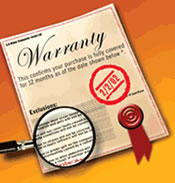After you have purchased that special diamond, there is still one more important step to ensure your future happiness. That step is to adequately insure your diamond against loss or damage. Next to an automobile, many first time diamond buyers find this is the largest personal property purchase of their life.
Many diamond buyers mistakenly think that because a diamond is the hardest substance in nature, they don’t need insurance. Wrong! Since we sell a great number of “replacement” diamonds, we have heard many sad stories of jewelry loss that could have had a much happier ending with the proper insurance strategy.
Our experience suggests that the greatest need for insurance comes from the following causes:
Theft is more prevalent than most people expect. A diamond ring left in a suitcase while enjoying the beach or pool can suddenly disappear. A diamond ring left for just an instant in a public wash room will probably never be seen again. Uninvited “guests” in your home seek out your jewelry drawer in your bedroom dresser for a quick touch of larceny.
 Accidental loss happens when you least expect it. A single prong weakened by wear can suddenly release its hold on your beautiful diamond and you’ll not likely notice the loss of weight from your finger. You wouldn’t believe all the diamonds that fall out of mountings while working in the yard or doing dishes in the sink.
Accidental loss happens when you least expect it. A single prong weakened by wear can suddenly release its hold on your beautiful diamond and you’ll not likely notice the loss of weight from your finger. You wouldn’t believe all the diamonds that fall out of mountings while working in the yard or doing dishes in the sink.
Damage can occur for even the hardest of gems. While a diamond is hard, it is also a crystal that will fracture if struck a hard blow. The wrong bump with a grocery cart or a door handle can cause thousands of dollars in damage in an instant.
The bottom line is to get your diamond insured immediately and be sure your insurance covers damage and loss.
Most jewelry owners either have too much insurance, not enough insurance or worse yet, no insurance. The more you know about insurance, the better able you will be to get the right insurance now and for many years to come.
You can insure your jewelry through your homeowners or renters insurance or through a separate insurance company specializing in jewelry insurance such as Jewelers Mutual Insurance Company or Chubb Group of Insurance Companies.
Chubb Group of Insurance Companies
Chubb is one insurance company that specializes in collectibles, including jewelry and is the only insurance company we know of that will insure a loose diamond. Chubb is one insurance company that offers polices through independent insurance agents and jewelry retailers. Click here for more information on Chubb jewelry insurance coverage and how to apply.
Jewelers Mutual Insurance Company
Jewelers Mutual offers personal jewelry insurance that covers both repair and replacement. The policy does not cover unset stones, damaged items or antique jewelry. An appraisal is required for coverage. Click here for more information on Jewelers Mutual coverage and how to apply.
Homeowner’s and Renter’s Insurance
Both renter’s and homeowner’s insurance policies set limits for the loss of certain categories of personal property, including jewelry. Homeowner’s policies typically pay a maximum of $1,000 to $2,500 for theft of jewelry depending on the company and policy. A renter’s insurance policy might have a lower limit for jewelry loss. You need to know if your insurance coverage provides for loss other than theft, such as for lost or damaged items. Read your policy carefully and ask your insurance agent to clarify the types of loss that are covered on your standard policy.
You can usually purchase additional coverage and have your jewelry “scheduled,” which means each piece is appraised, described and value individually listed. Scheduled property insurance usually covers most causes of jewelry loss. Here are some of the questions you need to ask:
- Is there a deductible? If so, how will changing the level of the deductible impact your premium costs?
- Is an appraisal required? If so, are there any special requirements for the appraisal and who can prepare it?
- Is there any geographic limit to coverage? For example, are you covered during domestic or international travel?
- Are items covered for full replacement cost? Must you replace the item, or can you get a cash settlement?
- Does the policy cover repairs to damaged jewelry?
There are three types of basic polices (depending on your state and the insurance company).
Actual Cash Value
In the even of a loss the item is replaced by the insurance company at the current cost to replace less depreciation. This is not that common for jewelry, but you need to know what kind of coverage you are paying for.
Agreed Value
In an “as agreed” type policy, the insurance company simply pays you the insured amount, providing it is not grossly overvalued. Chubb Group of Insurance Companies offers this type of coverage and is known for writing checks quickly for the full amount and with little hassle when a claim is filed. You list all of your valuable possessions with a specific value for each piece. In the event of loss, you can receive a check for the exact amount for the damaged or lost item.
Replacement
With a Replacement policy, you will receive either the insured value or the actual cost that the insurance company would have to spend to replace the item, whichever is lower. Since insurance companies are volume purchases, they often have discount suppliers who have prices lower than the insured amount.
The value stated on the appraisal often sets the upper limit that the insurance company is libel for with any claim. If the policy is a replacement type policy, the insurance company may have the option of sending you to a replacement center of their choice. You deserve to get a replacement that is equal in quality so be sure to have an appraiser examine the replacement offered to ensure the quality is acceptable based on the original appraisal.
The Right Amount of Protection
Since insurance companies are very knowledgeable of the value of diamonds and jewelry (they pay out claims every day), it makes no sense to over-insure your jewelry. Your target should be to insure it for about the amount that an insurance company would be able to replace it for. Then your premiums are paying for the right amount of protection.
We have replaced jewelry lost or stolen that was insured for the price that the client paid for in a local jewelry store. However, when they filed a claim for the item, they quickly discovered they had paid more than double the price they should have because the insurance company would only pay out about half the covered amount. They had paid double the insurance premium for many years and learned a lesson the hard way.
You want to insure your jewelry item for what a competitively price retail jewelry store would have during their “50% off sale” which is probably something 20% to 50% greater than our prices. With rising diamond prices, we can seldom replace an item six months later for the same price because we found the best value at the time of purchase. Ask your independent appraiser what they think an insurance company could replace it for.
Some states have an overpayment of premium rule. If they replace an item at a lower amount than the face value of the policy, the insured person is entitled to a refund of the difference between the two amounts that were paid as premiums. Do not expect your insurance agent to point this rule out to you. Check to see if you have it in your state and with your insurance company.
Beware of Life Time Warranty
 Many jewelry stores use a sales pitch that they will fix or replace your ring with a life time guarantee if anything happens to it. Do not accept their words without seeing it in writing and we suggest you run that contract by your attorney first. Generally their liability is only for loss or damage through their negligence. They also require you to have the item inspected in their store every six or twelve months.
Many jewelry stores use a sales pitch that they will fix or replace your ring with a life time guarantee if anything happens to it. Do not accept their words without seeing it in writing and we suggest you run that contract by your attorney first. Generally their liability is only for loss or damage through their negligence. They also require you to have the item inspected in their store every six or twelve months.
Here is the advertised wording for one of these warranties:
We guarantee complete satisfaction on your SayAnything Jewelers Diamond purchase. Your SayAnything’s Jewelers Diamond Warranty covers the replacement of any diamond (with one of equal value) that is lost or damaged while it is in its original mounting, provided a SayAnything’s Jewelers jeweler cleans and inspects (at no charge) your diamond(s) and mounting at least every six months and records the inspection on your warranty certificate. There are no warranties, written or oral, other than as set forth on the actual warranty form. The warrantor shall not be liable for incidental or consequential damages.
What happens if the ring is stolen? What happens if you lose the entire ring? What happens if it gets damaged due to some accident? What happens if you miss one of the inspection deadlines? What happens if you move to a different city? What happens if the store changes management? What are those “incidental” or “consequential” damages that they do not cover?
Unless you can get satisfactory, written answers to these questions, you should value that “warranty” for what it really is; marketing words used to persuade you to purchase. You need insurance to protect your valuables, not empty words from a sales clerk. We feel strongly about this subject because we have talked to too many consumers who were misinformed and failed to get the real insurance they needed. Now you know better.

